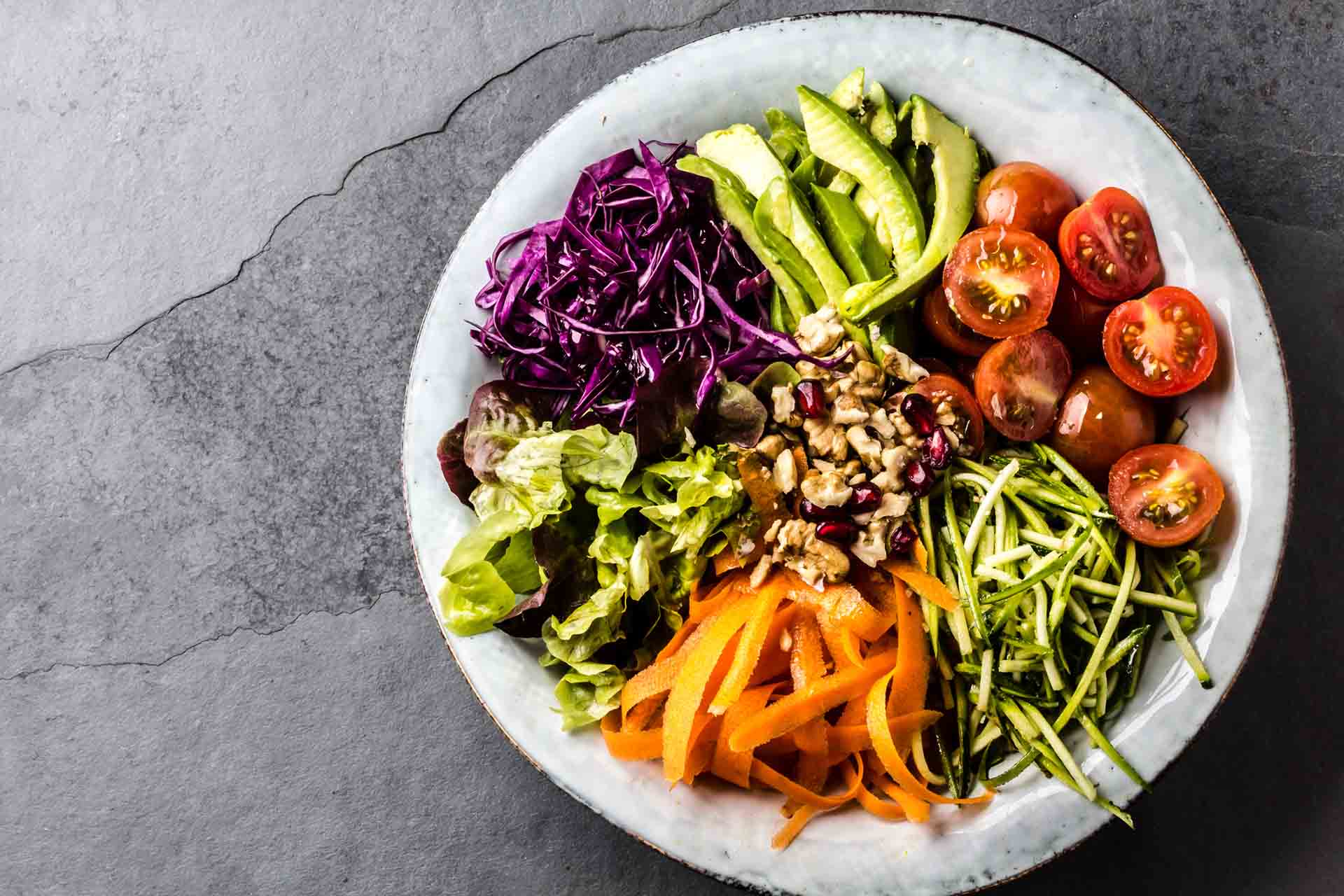Plant Based Beef vs. Traditional Meat: Which Is Better for the Environment?
Wiki Article
Everything About Healthy Food: Benefits of Taking On Plant Based Alternatives
The conversation bordering plant-based diet regimens has gotten substantial focus in the last few years. Many individuals are discovering the possible wellness benefits, dietary advantages, and environmental impacts related to these nutritional options. As people come to be much more knowledgeable about their food's impact on well-being and sustainability, questions occur about the functionalities of embracing such a way of living. What specific adjustments can one expect, and exactly how might these selections improve not only individual health however additionally the earth's future?Comprehending Plant-Based Diet Plans
Although many individuals connect plant-based diet regimens mainly with vegetarianism or veganism, these diet regimens can encompass a wide variety of consuming patterns that prioritize entire, minimally processed plant foods. Such diet plans frequently include fruits, veggies, whole grains, seeds, nuts, and legumes, while limiting or removing pet products. This versatility permits people to customize their dietary selections according to individual preferences and nutritional demands. Some might adopt a primarily plant-based diet plan while still sometimes consuming meat or dairy products, typically referred to as a flexitarian technique. The focus stays on including even more plant foods, which can lead to a diverse selection of tastes and meals. Comprehending these various analyses of plant-based eating is important for valuing its accessibility and charm in modern food society.Health Advantages of Plant-Based Foods
The health and wellness benefits of plant-based foods are significant, using a nutrient thickness benefit that sustains overall wellness. Research indicates that these foods can enhance heart wellness and play a necessary role in effective weight monitoring. By incorporating much more plant-based alternatives, people might enhance their nutritional options and promote lasting wellness.Nutrient Thickness Benefit
Nutrient density plays a vital duty in the health benefits of plant-based foods, making them a compelling choice for those seeking a well balanced diet regimen. Plant-based foods, such as fruits, vegetables, legumes, nuts, and whole grains, are often rich in important vitamins, minerals, and antioxidants while being reduced in calories. This high nutrient density allows individuals to consume less calories while still meeting their nutritional demands. In addition, these foods are loaded with dietary fiber, advertising digestive wellness and helping in weight monitoring. By including nutrient-dense plant-based choices, consumers can enhance their total wellness, support their immune systems, and reduce the threat of persistent diseases. Ultimately, the nutrient thickness of plant-based foods highlights their significance in a health-conscious lifestyle.Heart Wellness Enhancement

Weight Monitoring Assistance
Along with advertising heart health and wellness, a plant-based diet can substantially aid in weight management. This nutritional method highlights whole foods such as fruits, veggies, legumes, nuts, and whole grains, which are typically lower in calories and higher in fiber compared to animal-based products. The high fiber material helps increase satiety, minimizing general calorie intake. Additionally, plant-based diets are often abundant in essential nutrients while reduced in unhealthy fats, making it much easier to maintain a healthy and balanced weight. Plant Based Chicken. Study indicates that people that take on a plant-based way of living tend to have lower body mass indexes (BMIs) and experience even more effective weight-loss compared to those that consume meat-heavy diet regimens. Consequently, accepting plant-based alternatives is a strategic option for efficient weight monitoring
Nutritional Value of Plant-Based Components
Plant-based active ingredients are abundant in important nutrients, using a varied array of vitamins, minerals, and antioxidants that contribute to overall health. A contrast of healthy protein resources exposes that while pet items are typically considered as superior, numerous plant-based choices supply ample healthy protein and various other beneficial compounds. Comprehending the nutritional value of these components can aid people make educated dietary choices.Vital Nutrients in Plants
Nutrient-rich components located in plants supply a diverse selection of important minerals and vitamins that contribute significantly to overall health. These ingredients are rich in vitamins A, C, and K, which sustain immune feature, vision, and blood clot, respectively. Additionally, plants offer crucial minerals such as potassium, calcium, and magnesium, important for heart health and wellness, muscle mass function, and bone strength. The presence of fiber in plant-based foods help food digestion and advertises a healthy gut microbiome. Antioxidants, found abundantly in vegetables and fruits, help battle oxidative stress and minimize inflammation. Numerous plant foods are low in calories yet high in nutrients, making them a superb option for those seeking to keep a healthy weight while making certain excellent nutrient intake.
Comparing Protein Resources
Healthy protein resources differ significantly in their nutritional profiles, with plant-based ingredients offering unique benefits. Unlike pet healthy proteins, which typically include saturated fats and cholesterol, plant proteins tend to be reduced in these undesirable elements. Legumes, nuts, seeds, and whole grains are abundant in crucial amino acids, fiber, vitamins, and minerals. For example, lentils supply high healthy protein web content together with considerable iron and folate, while quinoa is a total protein, offering all nine important amino acids. Additionally, plant-based healthy proteins are often accompanied by antioxidants and phytochemicals that sustain general health and wellness. The change to plant-based healthy protein resources not just enhances dietary intake yet additionally straightens with lasting nutritional methods, lowering environmental effect and promoting long-lasting health advantages.Environmental Effect of Plant-Based Eating
As understanding of environment modification expands, numerous people are exploring lasting nutritional options that can greatly minimize their environmental footprint. Plant-based consuming has become a considerable factor to decreasing greenhouse gas exhausts, which are primarily connected with animals production. The farming of fruits, vegetables, grains, and veggies typically needs fewer resources, such as water and land, contrasted to animal farming. Additionally, plant-based diets can bring about decreased logging, Plant Based Chicken as much less land is needed for grazing livestock or expanding pet feed. By changing towards plant-based choices, consumers can sustain biodiversity and advertise much healthier ecological communities. In general, welcoming plant-based eating not only advantages individual health yet additionally represents an essential action toward environmental sustainability and conservation initiatives.Overcoming Common Misconceptions
While lots of people recognize the benefits of a plant-based diet plan, numerous false impressions typically hinder them from totally welcoming this way of living. An usual idea is that plant-based diet plans lack adequate protein; however, numerous plant sources, such as beans, nuts, and tofu, give enough healthy protein. Furthermore, some presume that this diet plan is expensive, when actually, staples like beans, rice, and seasonal veggies can be fairly cost effective. An additional misconception is that plant-based consuming is excessively restrictive, whereas it actually supplies a varied variety of foods and tastes. Finally, several fret that a plant-based diet plan may bring about shortages, yet with appropriate planning, people can obtain all necessary nutrients, consisting of nutrients, while appreciating a wide array of delicious dishes.Tips for Transitioning to a Plant-Based Way of life
Making the shift to a plant-based way of life can be an improving experience, though it often calls for some advice to navigate the initial changes. First, individuals are encouraged to begin progressively, incorporating more fruits, veggies, beans, and whole grains into their dishes while reducing meat and milk usage. Dish preparation is necessary; preparing a weekly menu can assist reduce the change and stop final unhealthy options. Checking out cooking techniques and new recipes can additionally preserve and boost the experience exhilaration regarding plant-based consuming. In addition, joining support system or areas can offer motivation and share valuable ideas. Remaining informed concerning nutrition guarantees balanced meals, avoiding deficiencies while fostering a healthy, rewarding plant-based way of living.
Delicious Plant-Based Dish Concepts
Exploring tasty plant-based meal ideas can influence individuals to embrace a more nutritious diet. One preferred option is a passionate quinoa salad, including cherry tomatoes, cucumber, and a tangy lemon-tahini clothing. One more favorite is a full-flavored lentil stew, loaded with carrots, celery, and fragrant natural herbs, excellent for a comforting dinner. For morning meal, overnight oats made with almond milk, chia seeds, and topped with fresh berries supply a nutritious begin to the day. Furthermore, a dynamic veggie stir-fry with tofu and a variety of vibrant veggies can be a quick yet pleasing dish. Finally, velvety avocado salute on whole-grain bread, sprinkled with spices and seeds, uses an easy yet delicious treat. These dishes display the selection and splendor of plant-based eating.
Frequently Asked Questions
Can a Plant-Based Diet Regimen Supply Enough Protein?
The inquiry of whether a plant-based diet plan can supply adequate healthy protein is typical. Various resources, consisting of legumes, nuts, seeds, and entire grains, can satisfy protein requires efficiently, supporting a well balanced and nutritious diet for people.Are Plant-Based Diets Ideal for Children?
The viability of plant-based diet plans for children depends upon careful preparation. Sufficient nutrients should be guaranteed, consisting of minerals, proteins, and vitamins. With correct support, such diets can sustain healthy growth and growth in children.Just how Do I Dine Out on a Plant-Based Diet plan?
Eating in restaurants on a plant-based diet regimen includes looking for restaurants with diverse food selections, asking for adjustments, and discovering vegan-friendly options. Preparation in advance and communicating nutritional choices can enhance the eating experience while keeping dietary options.What Are Usual Allergens in Plant-Based Foods?
Common irritants in plant-based foods consist of soy, gluten, nuts, and seeds - Plant Based Chicken. People adhering to a plant-based diet ought to be conscious of these irritants and check out tags meticulously to avoid unfavorable responses and ensure secure intakeCan Plant-Based Diets Assist With Fat Burning?
Research indicates that embracing a plant-based diet plan might assist in fat burning due to its usually reduced calorie thickness and greater fiber material. This mix can improve satiation, assisting individuals manage their caloric intake efficiently. Numerous people associate plant-based diets primarily with vegetarianism or veganism, these diets can encompass a broad range of eating patterns that focus on entire, minimally refined plant foods. Nutrient thickness plays a necessary duty in the health and wellness benefits of plant-based foods, making them a compelling choice for those seeking a well balanced diet regimen. Plant-based diet plans have been shown to significantly enhance heart health and wellness, as they commonly include aspects that sustain cardio feature. In addition to promoting heart wellness, a plant-based diet regimen can significantly help in weight management. An usual idea is that plant-based diet regimens lack adequate healthy protein; nevertheless, various plant sources, such as beans, nuts, and tofu, supply sufficient healthy protein.Report this wiki page